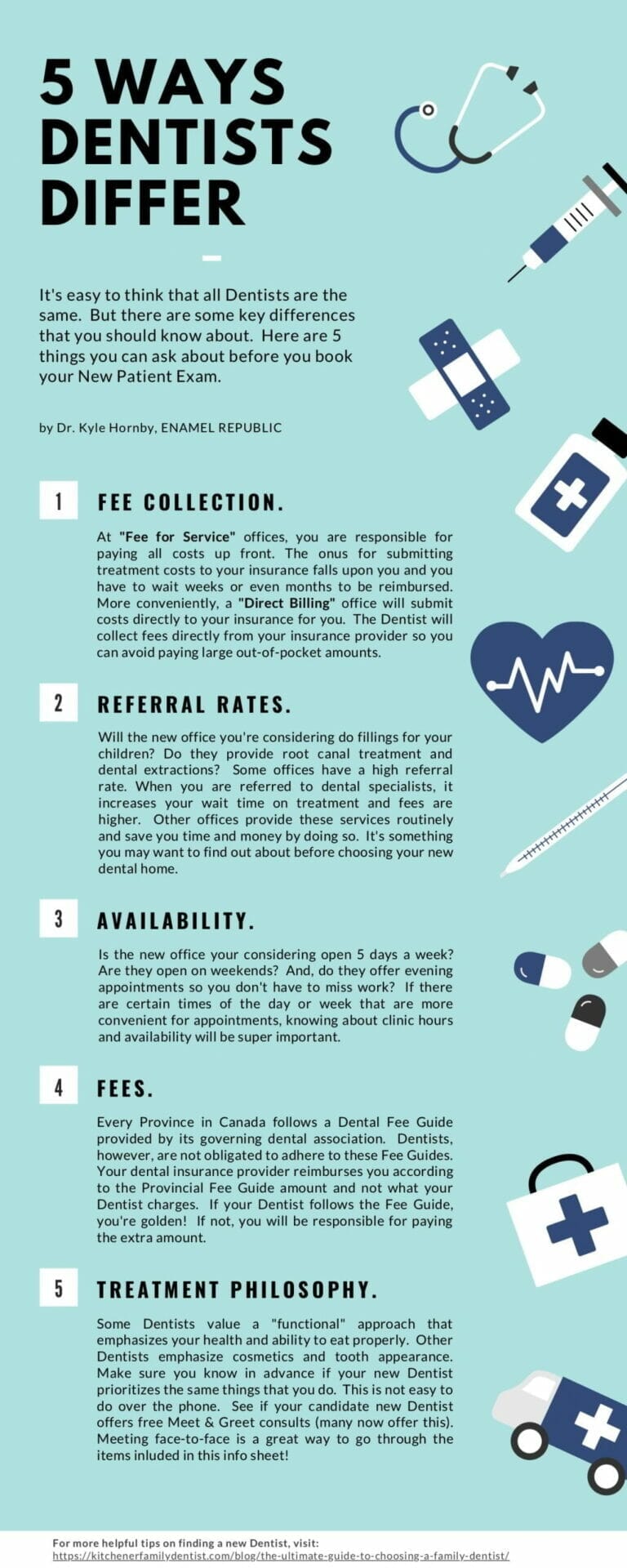
If you are new to the area, finding a Family Dentist in Kitchener doesn't have to feel like a daunting task. Most of us already have a stable of service providers that help us out from year-to-year. Accountant, Automotive Mechanic, Contractor, Realtor, and Family Doctor are just a few categories of service providers that have the capability to make your life better, more comfortable and, hopefully, a little bit easier.
I often hear people say things like: “oh, I have a great mechanic…honest and he/she does great work. Let me get you their contact info…”. It makes people feel good to know that they have a service provider on whom they can rely. It provides you with the piece-of-mind and comfort of knowing that the person will do what’s in your best interest. When you can trust your Accountant or Contractor, your interactions with them become a little easier and you know you’ve found someone that you can stick with for a long time. The other side of the same coin is that finding a reliable Dentist or Realtor can be a painstaking process. Below is a comprehensive guide to finding a great Family Dentist in Kitchener. But first, “what are the benefits of having a regular Family Dentist?
A Family Dentist or General Dentist provides regular dental cleanings and dental examinations at their office or dental clinic. As you accumulate a dental history including cleanings, treatments, check-ups, emergency examinations and consults your Family Dentist gains an understanding about your overall oral health, stability of your teeth and gums and developing or recurring symptoms or problems you have encountered. Having a long-term relationship with a Dentist you trust and with whose health philosophy you are aligned is the gold standard in dental care and should be the goal for everyone.
Continuity in dental care is tremendously advantageous. For example, some patients engage in tooth grinding or tooth clenching and develop intermittent and recurring symptoms associated with this activity. Some of these symptoms including deep aching pain in the jaw, toothache or pain on biting can mirror symptoms associated with a dental abscess. Other patients have recurrent sinus pain at particular times of the year and the associated symptoms can sometimes manifest as an achey or “abscessed” tooth. A new or unfamiliar Dentist might mistake these symptoms as an indication for root canal treatment. I have many patients with periodic grinding/clenching habits and those with seasonal sinus issues and pain and we often decide together to wait and observe symptoms for 2-3 weeks for remission.
In almost 100% of these cases, symptoms remit without treatment or the use of antibiotics. The patient ends up being treated with the fabrication of a protective night guard instead of an unnecessary root canal treatment.
As you build a history with a Family Dentist, they gain an understanding of regular issues and symptoms you encounter, your healthcare philosophies, and in most cases how to be the best possible helper toward you maintaining a stable and functional oral complex with minimal treatment. Jumping from Dentist to Dentist is typically not consistent with the best overall care. Consider seeking out a regular Family Dentist whom you can stick with for the long haul.
So…how do you do that? Below are resources you can use toward finding a Family Dentist that will be a good fit for you.

You might be looking for a Dentist in Kitchener. You might be looking for a Dentist in Waterloo. Maybe, you’re looking for a Dentist in Breslau. Proximity to home or workplace has become an increasingly important factor in choosing a Dentist in recent years. Some people are still willing to make a long trip to see a Dentist they have come to trust, but in most cases people choosing a new Dentist will look for one that is close to home.
It is no surprise then, that one of the most popular search strings typed into Google by those trying to find a new Dentist is “dentist near me”. If you enter this search string while on a computer in Kitchener, Google will provide you with a long list of Dentists in Kitchener. When you are searching on a computer in Breslau, you will receive a wide variety of options for choosing a Dentist in Breslau. If proximity is critical to you, start your search in this manner and then trim your list of potential Dentists down from there.
So, what other factor are important?

Their are 2 general avenues for researching reputation. In a small enough town or city, you may be able to ask friends, family or colleagues about a particular Dentist and gain some useful information that way. In larger cities, where 50 or more Dentists may be practicing at a given time, it may be more difficult to find an individual you know that has information on a given practitioner. If you are searching for a Dentist in Kitchener or if you need to locate a Dentist in Waterloo, you will probably want to look at online reviews to gleam some amount of useful information about a person’s reputation.
Searches in Google will yield a “local pack” section containing 3-4 Dentists and associated Google reviews. Unfortunately, these results will not always provide the top 3-4 ranking Dentists, however, you can select a rating threshold (i.e. 4.5 stars and above) to limit search results to only the top-ranking Dentists. You can achieve a similar result by typing “top rated dentist in Kitchener”. Google reviews as a means of selecting any service provider is not always a perfect solution but, I still believe that this method can be helpful. For instance, you might come across 3 local dentists in your area rating in the 4.5-5 star range but 1 might have 100+ reviews while the others have fewer than 10 reviews. So, in addition to overall star rating, Google provides you with information that can help you decide how accurate the ratings are likely to be based on volume.
Another popular reputation measurement platform is provided by RateMDs (www.ratemds.com). This website accumulates anonymous reviews for Physicians, Medical Specialists and Dentists as well as practitioners in other fields. Ratings are provided on a 1-5 star system and allow for reviewers to include comments to substantiate their rating. I often find the comments are more informative than the ratings themselves. If you survey 20-30 reviews, you can often discover what things people like about a given Dentist (i.e. ritzy office, trustworthiness, great staff/team, transparency, etc.,).
Keep in mind, different individuals value different things. A series of individuals raving about the organic coffee offered at one office might not prioritize the same factors that you do. Maybe a tidy, no-frills office, that is respected for their punctuality is a better fit for you. It’s up to you to decide. So, whether you are looking for a family dentist in Kitchener or a children’s dentist in Waterloo, you can find volumes of online feedback that (while not a perfect measuring stick) will give you some idea about which practitioners people like and why they like them.
After locating nearby Dentists, give them a call to make sure they are accepting new patients. Do some research on their reputation. Can you do any further research before making your decision? Should you talk to a Dentist and his/her team before committing to a family dental practice?
Well, I believe that you can (and should) go beyond online sources to gather more information about a prospective Dentist and their practice. So, how would you go about doing this?
Consultations:
Perhaps the best way to find out if a particular Dentist is right for you is to meet with them. The difficulty with this approach is that, historically, Dentists charged for one-off appointments like Specific Exams and Consults. Once you have incurred financial expense at an office, the reality is that you are likely to move forward with the Dentist there whether you liked them or not. The simple reason is that people are loss-averse and will often feel that money paid for a consult appointment is wasted if they choose to “try out” a different Dentist at further expense.
Luckily, some offices offer free consults and others offer appointments. I often meet with potential patients, free of charge, so that we can chat and so that they can decide if I am a good fit for them as a Dentist. I find it usually takes people 10-15 minutes to get a good “feel” for what our office is about and if they like our philosophy. Outside of the time spent, an individual does not have to incur financial expense to learn more about us.
But, you might, ask: “Aren’t all Dentists pretty much the same?”.
One thing that I find interesting is that a significant percentage of people I ask will say that “A Dentist is a Dentist is a Dentist”. I believe many people also think this way about family doctors. I can appreciate why they might have such a belief - Dentists undergo a fairly standardized training in Canada and so should have similar capabilities and offer similar services. However, I can assure you that this is not true. We are fortunate that Kitchener-Waterloo boasts a high standard of care among it’s Family Dentists and Specialists. However, even within this group of high-level practitioners, there exists a lot of variety. This variety is fairly normal within any field. Here are some of the important parameters on which Dentists might differ:
Referral Tendencies
In recent years there has been a trend whereby an increasing proportion of Family Dentists now refer treatments that used to be completed mostly at General Dental offices. Procedures such as root canal treatments and routine tooth extractions are now more likely to be completed at the office of specialists like Endodontists and Oral Surgeons, respectively. Much to the frustration of parents, their children are often referred to a Pediatric Dentist to have fillings completed. These trends lead to elevated treatment costs and longer wait times for treatment. Keep in mind, there are trade-offs in play here: I have friends that know their Dentist does not provide certain routine treatments but happily accept this given their Dentist’s excellent manner, trustworthiness and communication skills.
Some of the questions you can ask a prospective Dentist include:
“Do you tend to refer young children for fillings and other treatment?”
“Under what circumstances do you refer children for Pediatric Dentistry treatment?”
“Do you do your own root canal treatments? Can you perform Molar root canal treatments?”
“Do you provide dentures and related surgical services?"
(If you are interested in a comprehensive guide to dentures, please view our Ultimate FAQ Denture Guide here).
“Do you remove impacted wisdom teeth?”
(Dentists who perform impacted wisdom tooth extraction are likely to have a high degree of proficiency in oral surgery. They probably complete most or all dental extractions as well as related procedures like tissue or bone grafting in-office as well).
Prioritization of Cosmetic Dentistry
Another developing trend is that General Dentists are, on average, focusing more time on offering Aesthetic procedures like veneers, composite bonding, tooth whitening, and Invisalign orthodontics. Some might consider themselves “Cosmetic Dentists”. If you are interested in having straighter, whiter teeth, then these Dentists might appeal to you. If you are more concerned with functional dentistry aimed at maintaining adequate oral health, then you might not like a Dentist who presents orthodontic alignment or “tooth straightening” as a necessary procedure for you. It is critical for you to understand when recommendations are for purely aesthetic outcomes versus proper function and oral health. A Dentist can and should provide you with and adequate explanation of reasons for treatment.
You might want to ask a prospective Dentist in Kitchener-Waterloo:
“What percentage of your work is considered cosmetic dentistry?”
“Do you recommend cosmetic procedures as part of your assessments?”
(If the Dentist does recommend cosmetic procedures as part of their initial assessment and treatment planning it is important that they disclose to you what treatments are necessary for functional and health-related purposes and which are elective treatments to improve your appearance. In 2012, CBC Marketplace produced a special report on Dentists in Canada and emphasized the variability in treatment planning among 20 different Dentists in Toronto and Vancouver. One individual solicited examination and treatment planning from each Dentist yielding treatment estimates varying from $144 to $11,931. In many cases, the more expensive treatment plans resulted from recommendation for purely aesthetic work including orthodontic alignment or “dental braces” and dental veneer placement.)
Transparency

There was a model of dentistry practiced 20 - 30 years ago and earlier whereby a patient went to their Dentist to be told what treatment they needed to fix teeth, gums, and maintain overall oral health. It was an Authoritarian model of care. Transparency through explanation was not always common. A thorough discussion of all treatment options was not always the norm. There was little room for patients to advocate for themselves. This is not because those family dentists were mean or unreasonable, it is more a reflection of the times and the training Dentists received.
In recent years, there has been more of a focus on training Dentists to provide all options, discuss financial costs, risks, benefits and act as a guide in helping patients decide on the treatment that suits them best. Patients are now able to play a more significant role in their own care. I think this is a wonderful change. Technology has developed to support this new direction for dental care. Specifically, imaging technology like hi-definition intra-oral cameras enable Family Dentists to provide patients with visual evidence of tooth decay or cavities, gingivitis and gum disease, failing or broken dental fillings, dental crowns or dental bridges and more.
Dentists now have the ability to show you things in the mouth you weren’t able to see before. So, you might want to ask your prospective Dentist in Kitchener:
“Do you tend to show patients intra-oral pictures to explain why treatment is needed?”
Alternately, you can share things that you liked about past Dentists to see how a prospective Dentist responds. Try something like:
“In the past, I really liked that my family dentist always showed me pictures of the cavities she found prior to recommending treatment. Can we continue that here at your clinic?”
Thresholds for Treatment and Overall Philosophy
This is probably where the range of variation between Dentists is greatest. Some Dentists believe in maintaining an ideal situation in the mouth at all costs while other Dentists use patient function and comfort as a measuring stick for what is right for them. The former will look at a patient who is missing 3 teeth and formulate a treatment plan to replace all 3 teeth. The latter will ask the patient, “are you able to eat the foods you want to eat?” or “do you feel at all limited since you lost those teeth?”. The first Dentist will look at gum recession and recommend connective tissue grafting or “gum grafting”. The second Dentist will discuss recession severity, recommend preventive measures and observe for a period of time for stability.
Neither approach is incorrect. You can argue that the second Dentist’s approach is more flexible and adaptable but, still, I have met many patients that will lose a tooth and can’t wait to undergo treatment to replace it. Those patients will match up quite well with a Dentist that treatment plans to keep things in the mouth in ideal condition.
In many cases, you have time to observe a situation and gain more information before making a decision. If tooth decay or gum disease necessitates tooth extraction or tooth loss, I would argue that you can let things heal for 3-6 months and then decide if you miss your tooth or not. Everybody is different. Thus, the proper treatment for one patient might differ from proper treatment for another. Always remember that treatment is expensive and so it should provide you with value. If you are missing a single tooth due to tooth extraction, the tooth has been gone for 10 years, and you feel comfortable in eating the foods you like, you might argue that paying $3,000 for a dental bridge or $5,000 for a dental implant is not providing you with good value. But, ultimately, that is for you, the patient, to decide.
You can probe a prospective Dentist to learn more about how conservative they are in recommending treatment with the following questions:
“Do you believe that all missing teeth should be replaced?”
“Under what conditions do you recommend gum grafting?”
Or, if you prefer a more indirect approach you can share your preferences with a prospective Family Dentist in the following way:
“I like that my previous Dentist never pressured me to undergo treatment and was always willing to observe a situation to see if it was stable…”
Patients have told me this in the past and I always appreciate them letting me know what their preferences are. Because our clinic is very conservative in recommending treatment, we end up being a good match for these patients. Remember that it is not about right or wrong, good or bad, but rather about fit. If you like transparency, full-disclosure, taking part in your oral health decisions, and minimally invasive dental care then there are Dentists out there that will be a perfect match for you. If you like the same things but prefer a Dentist that nudges you in a particular direction (some patients even prefer a Dentist that tells them what is best) then there will be a different group of Family Dentists that fit you best.

Independent studies have suggested the incidence of moderate to severe dental anxiety to be as high as 80% within the general population. Moreover, dental phobia has been estimated to be present in 10-15% of people. For many people, it is not easy to sit in a dental chair to undergo treatment. Oftentimes, anxious patients develop the ability to have treatment completed with the help of dental sedation (sometimes called "sleep dentistry") such as nitrous oxide or “laughing gas”. Importantly, not all Family Dentists are certified or trained to provide sedation to their patients. A Dentist may be certified in mild-moderate conscious sedation and can administer to their patients nitrous oxide or oral sedatives such as Lorazepam. Other Dentists have more comprehensive sedation training and can provide intravenous sedation or even general anesthesia.
If you experience dental anxiety that has prevented you from seeking treatment in the past, it would be valuable for you to confirm that a prospective Family Dentist provides sedation options.
As I mentioned above, having a regular Family Dentist in Kitchener has many benefits compared to seeking irregular, emergency treatment at different clinics as pain and symptoms arise. When you have a committed Family Dentist, they get to know you over time. They learn about habits you have like tooth grinding and clenching or “bruxing” and ask you if you are wearing your night guard at check-ups. They know if you have medical conditions or take medications that give you a dry mouth making you prone to cavities (and they develop solutions to offset these negative effects). Having a Dentist that you can count on, year after year, is the gold standard for oral health care maintenance.
With the rise of corporately-owned dental offices, as well as offices owned by (but not occupied by) “investor dentists”, more and more practices are staffed with dentists who have no ownership stake. These clinics commonly have frequent turnover of Dentists and patients often find that they see a different Dentist at each visit. To ensure that you are getting the gold standard in oral health maintenance, you may want to call a prospective Dental Clinic and ask:
“Who owns the clinic and how often do they practice there?”
“Does the owner practice at any other clinics?”
“How many dentists work at the clinic? Can I pick one of the Dentists and have a good chance of seeing them for exams and treatment most or all of the time?”
It is important for me to mention that, in some cases, a clinic offering multiple Dentists can provide you with better emergency coverage. More practicing Dentists typically correlates with expanded hours and more flexibility for scheduling emergency appointments. A good strategy for locating a new dental home would be to ensure that you can be assigned to a single Dentist with whom you can grow, but where one or more other Dentists also practice so that you can benefit from expanded hours and the likelihood that the clinic can see you promptly under emergency circumstances.

There are generally two systems for collecting dental treatment fees. A direct billing Dentist will submit fees directly to your insurance provider and collect only the co-payment or deductible from you, the patient. This is convenient as most insurance plans cover 80% or more of eligible expenses. So, seeing a direct billing dentist in Kitchener-Waterloo means that you will significantly reduce the amount you pay at appointments.
The alternative to a direct billing Dentist is one that collects according to a “Fee-For-Service” model. If the Dentist cannot collect insurance amounts immediately, they will require that you pay the entire treatment amount up front. You will then have to wait for your insurance company to reimburse you for costs. Obviously, large out-of-pocket expenditures are inconvenient for most people and collecting reimbursement sometimes requires multiple follow-ups with your insurance provider. It is no wonder that some of the most popular Google search strings used when people search for a dentist locally are “Kitchener dentist direct billing” or “direct billing dentist near me”. You can ascertain whether a prospective or candidate Dentist uses direct billing simply by exploring their website or by calling their office and asking.
The majority of family dentists will bill you or your insurance using set fees provided by the Ontario Dental Association Fee Guide. Many of these fees are a fixed value. A small portion of the fees in the guide are provided as a suggested range. For example, a one-surface bonded filling has a set cost while the price of an emergency exam can vary based on the amount of time provided to the patient to resolve their concern.
Some dentists, however, charge or bill “above the fee guide”. This may be a Family Dentist that has pursued additional training in one or more areas and the individual feels that they should be compensated additionally for their expertise. Importantly, dental insurance providers reimburse according to the ODA Fee Guide. This means that, if you see a Dentist who bills more than the amount suggested in the Fee Guide, you will be responsible for these additional amounts. Importantly, these Dentists are completely entitled to set their own fees but it is important that you are made aware of this. You can always feel free to enquire about this prior to your New Patient Exam or Consult.
As do the majority of family dental practices, the team at Enamel Republic bills according to fees set out in the Ontario Dental Association Fee Guide. This is one way that we ensure you are receiving quality affordable dentistry.
Once you choose your new Family Dentist in Kitchener-Waterloo, it will likely take some time to build a relationship and to build trust with him or her. There are things that you can track, analyze, or think about moving forward to constantly evaluate the fit between you and your new Family Dentist.

We are fortunate to live in a Kitchener-Waterloo region that boasts many fantastic Family Dentists and Dental Specialists. It ensures us all a high average standard of dental care. Our goal at Enamel Republic Family Dentistry is to provide conservative, minimally interventive, transparent & affordable dentistry. If you have perused our website and feel that our philosophy is aligned with your dental priorities, please do give us a call to book a New Patient Exam. We look forward to meeting you and your family.
This article is intended to promote understanding of and knowledge about general oral health topics. It is not intended to be a substitute for professional advice, diagnosis or treatment. Always seek the advice of your Kitchener Dentist with any questions you may have regarding a dental condition or treatment.
Services
Routine Dentistry & Tooth Repair
Oral Surgery & Tooth Removal
Prosthetic Dentistry & Tooth Replacement
Protective/Preventive Services
Teeth Whitening
Schedule an Appointment Now
